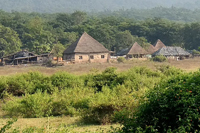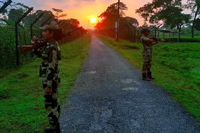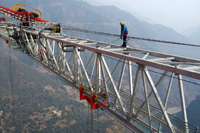
|

|
|
|
| |
Letter from the Editor-in-Chief
|
|
| |
|
|
| |
Dear Subscriber,
|
|
| |
|
|
| |
Development and conservation have always been a tough balancing act. Resource extraction and exploitation drive the wheels of economic progress, which in turn improves the quality of life for people. Development goals for large and populous countries like India dictate the pace and trajectory of social imperatives such as poverty elimination, food security, energy consumption, health, education, to name a few. But these imperatives directly clash with the need for ecological conservation. |
|
| |
In a broad sense, conservation doesn’t mean simply protecting our forests and rivers. It also means protecting the rights of the people who are directly dependent on them to derive their daily sustenance like adivasis, Scheduled Tribes and forest dwellers. They comprise sections of our population who live on the fringes of our society and are most vulnerable to the vagaries of resource exploitation. Further, they have lived on some of the most mineral-rich land for centuries, which gives them the rights to these common and collective resources. |
|
| |
In the cover story this month, we take this debate forward against the backdrop of the recently enacted Forest (Conservation) Amendment Rules, 2022. This amendment dilutes many critical provisions of the Forest Rights Act, 2006, which provided implied rights to forest dwellers and Scheduled Tribes and made it necessary to obtain the approval of gram sabhas for exploitation of natural resources in the protected areas. This right was upheld by the Supreme Court in a landmark judgment in 2013 in which it affirmed the primacy of rights of the Kondh tribe in the bauxite-rich Niyamgiri region of Odisha. But now, the new law has put the onus of securing the approval of gram sabhas on state governments, putting them on a collision course with their own people. |
|
| |
In this issue, we have also highlighted the rising incidence of “modern slavery”, which has been brought out by a report published by the International Labour Organisation. Despite economic progress, modern slavery through forced labour and forced marriage has seen a significant rise in the past five years. |
|
| |
We also carry a heartwarming story about a unique girls’ cricket team from the Shahbad Dairy area in Outer Delhi, which is one of the most crime-prone parts of the capital. These girls have claimed their rightful place in public space through sport. |
|
| |
|
|
| |
Please browse through the round-up of Tatsat Chronicle newsletter till October 15, 2022.
|
|
| |
|
|
|
| |
 |
|
| Top Story : Bonfire of Forest Rights |
|
| On the one hand the government waxes eloquent about protecting the environment, on the other it passes amendments to forest laws that dilute the rights of indigenous people deriving sustenance from forests. The latest set of amendments of forest laws for ease of mining passed by the Centre disempowers forest-dweller gram sabhas... |
|
|
 |
|
| Second Lede : Rogue Flying Objects |
|
| Besides guarding India’s borders against traditional adversaries and smugglers, the BSF is dealing with a new security threat element—small drones that are operated from inside Pakistan are being used to drop weapons and contraband in Indian territory. The alarming aspect is that the security establishment hasn’t found a robust countermeasure yet... |
|
|
 |
|
| Deep Dive : Modern Slavery Is On The Rise |
|
| The latest data compiled by the ILO reveals that modern slavery is not only thriving but also increasing, despite growing awareness and economic progress. The Asia-Pacific, which is the world’s most populous region, leads in perpetuating modern slavery... |
|
|
 |
|
| Commentary : Risky Rides |
|
| The railways have been critical for India’s economic development since the first rail lines were laid by the British for resource exploitation. But in modern-day India, the push for the steel lines into the Himalaya comes at the cost of the environment and accidents that imperil lives |
|
|
|
|
|
 |
|
|
|
 |
|
|
|
 |
|
|
|
 |
|
|
|
|
|
| |
|
|
| |
|
|
| |
|
|
| |
|
|
| |
|
|
|
| |
603, 6th Floor, Surya Kiran Building, K. G. Marg, Connaught Place, New Delhi-110001 |
|
| |
For questions or suggestions, contact info@tatsatchronicle.com
Copyright © 2021, Tatsat Chronicle | All rights reserved. |
|
|
| |
VISIT OUR WEBSITE |
|
|
| |
|
|
|
|










